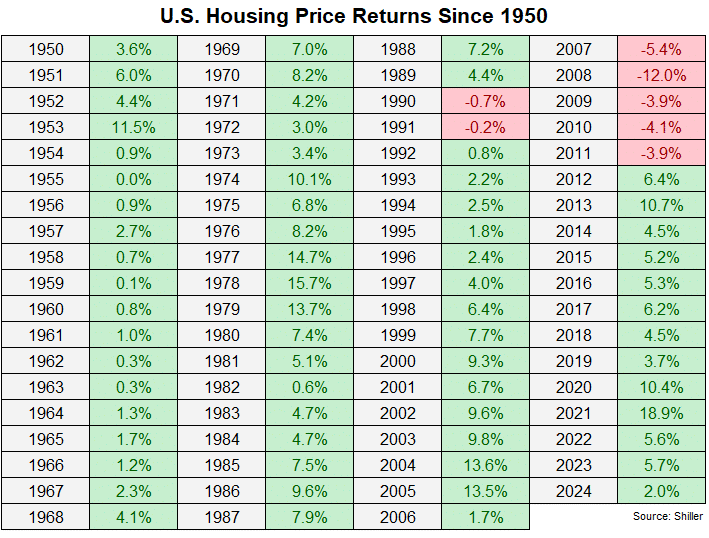Of all the places to put your money to grow over time, investing in real estate really seems to grab people’s attention.
Not only do most of my conversations about money and investing eventually lead to someone telling me how passionate they are about getting into real estate, but apart from my own anecdotal evidence, real estate takes the top spot in Gallup’s annual survey about what people think is the best investment.
As I wrote about a few months ago, real estate has been America’s favorite investment for 12 consecutive years now. And the gap between real estate and second-place stocks is significant.
Do the other asset classes need to hire new PR teams? Maybe stocks and bonds should introduce a new media marketing strategy to try and keep up with the endless stream of Grant Cardone TikTok videos.
I’m sure there are many reasons why people think real estate is the best investment. For one, there’s just something alluring about that brick-and-mortar—it’s a tangible asset that you can touch and manage yourself.
I also imagine there’s something about the American Dream of homeownership and that a house is most people’s biggest purchase and largest financial asset. More people own real estate than any other type of asset, and people tend to believe that whatever asset class they own is the best type of investment.
I think another reason why people may prefer real estate to other asset classes is that it’s illiquid. There’s no electronic sign above the door of every house stating its current value for everyone to see all the time. Because of this, house prices don’t see a lot of volatility.
Ben Carlson recently shared a graph of annual returns for U.S. housing going back to 1950:

As you can see, outside of that nasty stretch from 2007 to 2011, housing prices hardly ever go down.
Does this consistency of returns mean that housing really is the best investment?
Not necessarily.
Quite the opposite of the housing market, the stock market experiences significant ups and downs throughout the year. This year alone we’ve seen a drop of 5.7% in April and another of 8.5% at the end of July.
However, despite this volatility, the Russell 3000 (a benchmark of the entire U.S. stock market) is up almost 20% so far this year.
There’s not a single year over the past 75 when real estate reached a 20% annual return.
The U.S. stock market has experienced a decline of 10% or more in 25 out of the last 45 years (56% of the time). And in 17 of those 25 years, the market ended up for the year.
Here are the annual returns broken down by asset class from 1928 to 2023:
- Stocks +9.8%
- Bonds +4.6%
- Gold +4.9%
- Real Estate +4.2%
- Cash +3.3%
- Inflation +3.0%
Here’s another awesome graph by Ben Carlson showing the breakdown of returns for these asset classes by decade:

While the 2020s have been an anomaly for real estate returns with house prices up around 50% in just over four years, there isn’t a single decade where real estate has been the best-performing investment.
Now, does this mean real estate is a bad investment and everyone should put their money in stocks?
Of course not.
Calculating returns on real estate is difficult. When buying a house you have a lot of ancillary costs like property taxes, insurance, interest expense, realtor fees, closing costs, maintenance, renovations, landscaping, etc. These are all expenses that eat into your total return, and many people don’t factor them in at all.
Then on the other side, there is the leverage component to buying a property which can drastically increase your return depending on how much you put as a down payment.
It all gets so convoluted that I’m convinced most people have no idea what their exact return on investment is when it comes to real estate.
The bottom line is that each asset class is different. Each type of asset comes with its own level of risk, reward, and time commitment. There is no “perfect” investment. Everyone has different talents, risk preferences, and priorities that will determine which type of investment best suits them. It’s not required that everyone become a real estate mogul or an entrepreneur to become wealthy; the stock market also provides a way to own these assets indirectly.
Pick a wealth-building strategy you can stick with and one that fits your lifestyle.
Thanks for reading!

Jake Elm, CFP® is a financial advisor at Dentist Advisors. Jake a graduate of Utah Valley University’s nationally ranked Personal Financial Planning program. As a financial advisor at Dentist Advisors, he provides dentists with fiduciary guidance related to investments, debt, savings, taxes, and insurance. Learn more about Jake.

